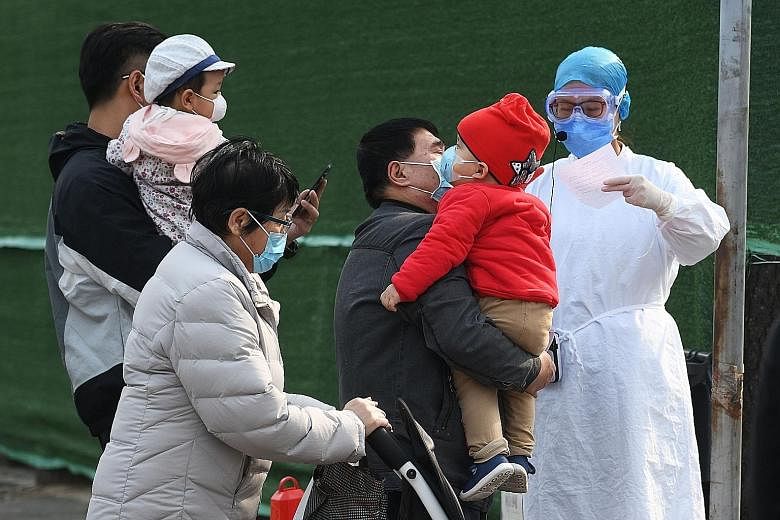Covid-19 has infected 57 children - those aged 16 and younger - in Singapore, but none has had to be in the intensive care unit, said the Ministry of Health (MOH).
It added yesterday that 42 have recovered while 15 remain in hospital.
None of them suffered from serious inflammatory symptoms, such as those seen in places such as Europe and the United States, where a number of children have exhibited symptoms similar to those of Kawasaki disease.
Reuters reported last Thursday that Italian and British medical experts have been investigating a possible link between Covid-19 infection and clusters of severe inflammatory disease in infants showing high fever and swollen arteries.
Associate Professor Hsu Li Yang, programme leader (infectious diseases) and co-director of global health at the National University of Singapore's Saw Swee Hock School of Public Health, noted that not all of them have been tested or found to have the virus, "so the association (between the inflammatory syndrome and Covid-19) is presently temporal" and would require more detailed investigations for confirmation.
Dr Mike Ryan, an emergencies expert at the World Health Organisation, told a briefing on April 29 that the vast majority of children infected with Covid-19 have a mild case of the disease and usually recover completely.
Only a small number in a few countries develop a "rare inflammatory syndrome", he noted.
Local paediatricians and general practitioners are aware of the inflammatory syndrome overseas and are keeping a lookout for Kawasaki symptoms in children.
Dr Ooi Pei Ling, a paediatrician at SBCC Baby and Child Clinic, said Kawasaki disease typically affects children younger than six years old, causing inflammation in the coronary arteries that supply blood to the heart.
While the cause of the disease is not fully understood, it could be a result of the immune system overreacting when triggered by a viral infection and then turning against the body. Asians are more genetically predisposed to getting Kawasaki disease than Caucasians.
So when countries such as Italy, Britain and the US detected a recent spike in children with the disease, it became a cause for concern as these may be linked to Covid-19 infections. Many have also developed severe symptoms.
However, Dr Ooi noted that some countries such as Japan, which sees more than 12,000 Kawasaki cases a year, have not reported an abnormal increase in infections. And Singapore, which records around 80 cases a year, has also not reported any recent spikes.
Dr Leong Choon Kit, a family physician at Mission Medical Clinic in Serangoon, said children with any infection, including Covid-19, may exhibit more severe symptoms than adults, but they may recover faster depending on the strength of their immune systems.
"If their immune systems are strong, they are more likely to develop the antibodies at a faster rate and may recover faster compared with adults," he said.
He added that the speed at which a child recovers depends on factors such as his body size, physiology and atopy status - the genetic tendency to develop allergic diseases.
When a child begins to develop the Kawasaki syndrome after an infection, it could suggest that his immune system is faulty and the body's immune response has resulted in an attack on its own cells.
What is Kawasaki disease?
Kawasaki disease is a rare illness that typically affects young children below six years old, causing inflammation in the coronary arteries that supply blood to the heart.
Though not fully understood, it is likely to be a result of one's immune system overreacting, possibly as a result of a viral infection.
Dr Ooi Pei Ling, a paediatrician at SBCC Baby and Child Clinic, said that in some cases, inflammation of the blood vessels could cause an aneurysm, which is a weakening and bulging of the blood vessel wall. This could raise the risk of blood clots and lead to a heart attack and internal bleeding, which may be life-threatening.
Hence, the disease is a leading cause of heart disease in children, particularly in developed nations. Common symptoms include:
• Fever for five days or more
• Red eyes
• Red lips or tongue
• Rashes
• Swollen neck, hands or feet
More severe symptoms, as seen in the cases in countries such as Italy, the United Kingdom and the United States, include low blood pressure, confusion, diarrhoea and abdominal pain.
According to a report by The Guardian news site on April 29, there were nearly 100 cases of a "rare syndrome" linked to Covid-19 that was seen in children in at least six countries, including the UK, US and Italy.
In an advisory sent out by the UK's National Health Service, doctors were told that at least 12 children were admitted to intensive care units, after showing symptoms typical of Kawasaki disease. They were also told to refer children who exhibit similar symptoms to hospital.












